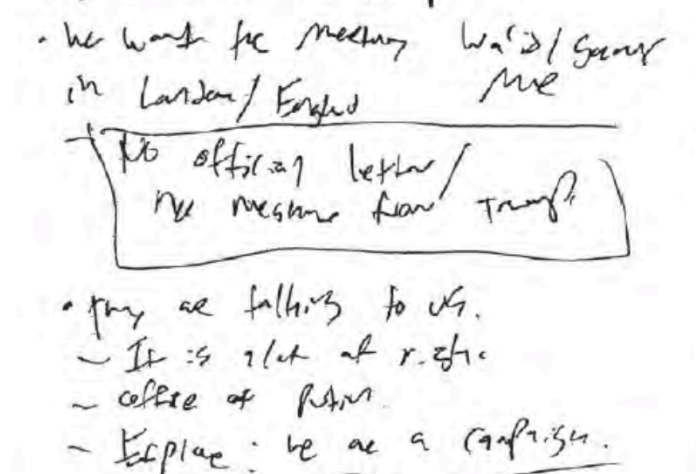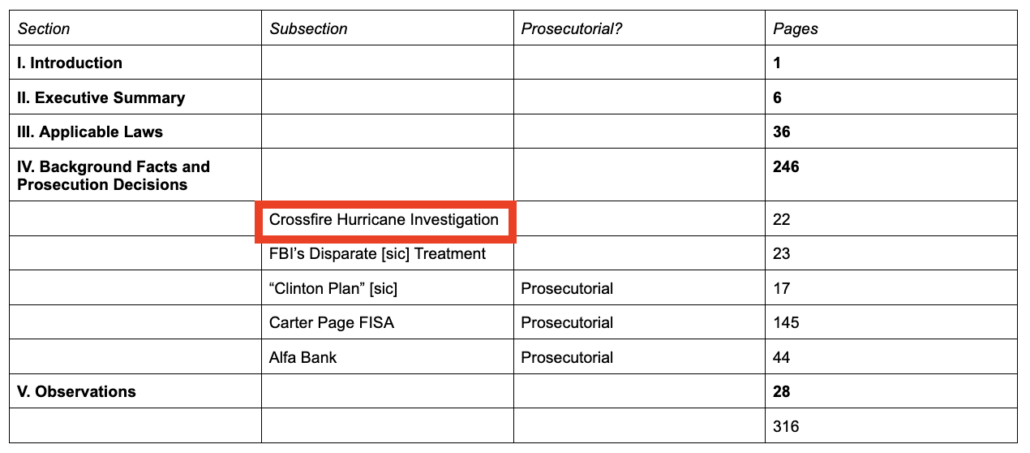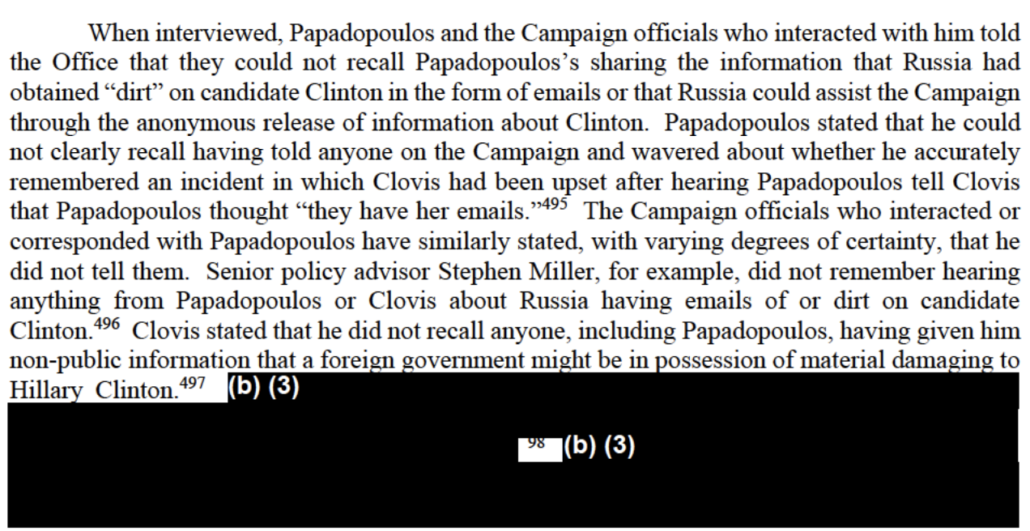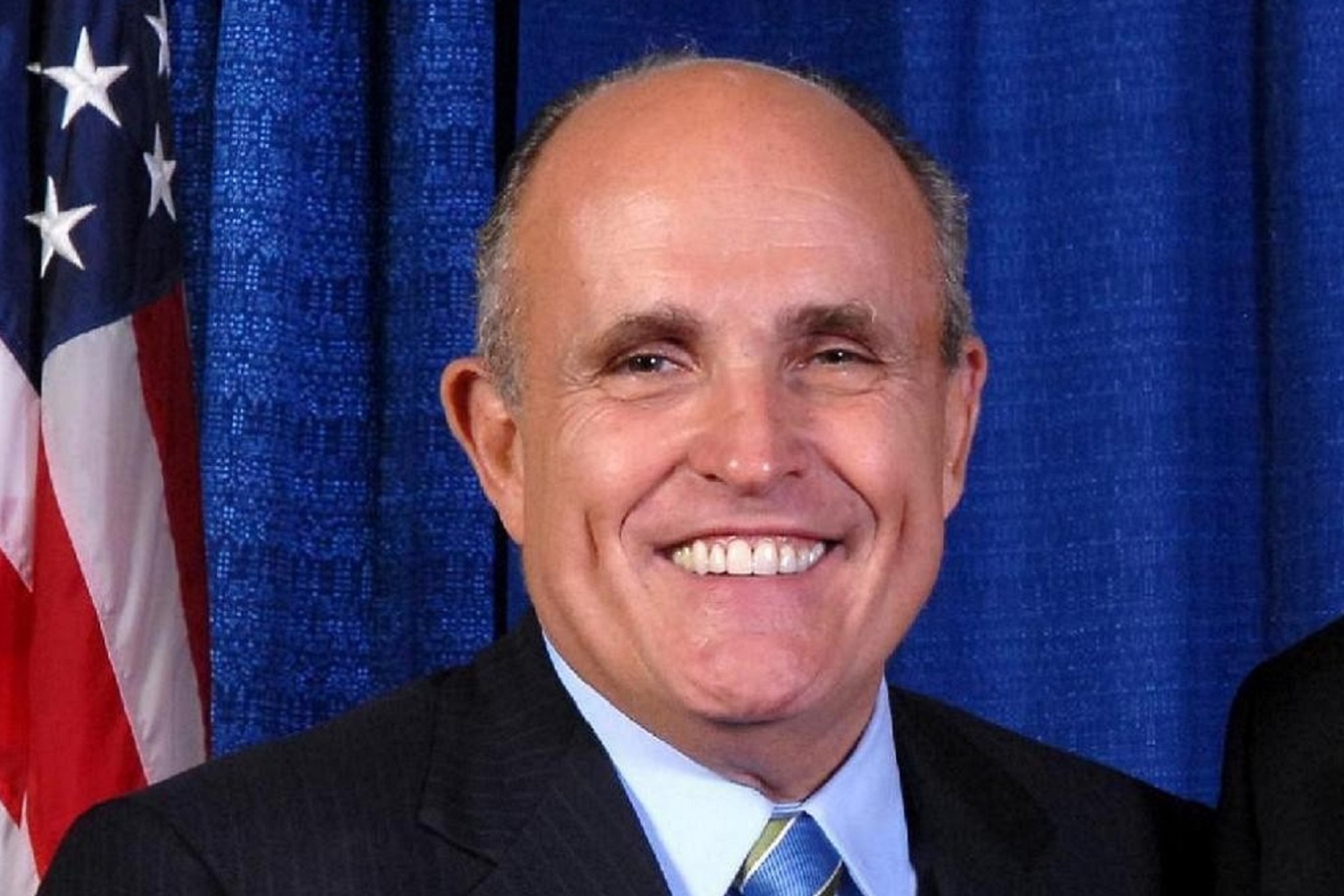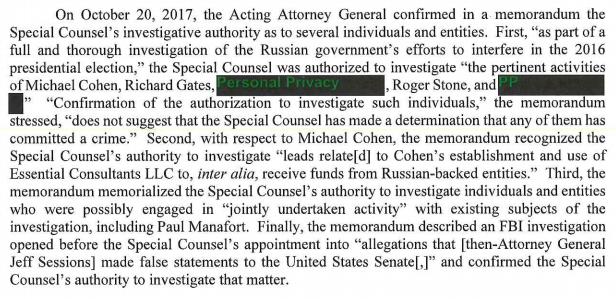John Durham, High Priest of the Cult of the Coffee Boy
One of the most telling passages in the entire Durham Report is this one:
245 See supra§ IV.A.3.a (discussing the views of Papadopoulos held by the Australian diplomats and noting his strengths and weaknesses). Understandably, as noted below, when Crossfire Hurricane was opened, serious efforts were made to keep the investigation quiet so as not to interfere with the upcoming election. Ultimately, however, the Mueller investigation reported that:
When interviewed, Papadopoulos and the Campaign officials who interacted with him told the [Mueller] Office that they could not recall Papadopoulos’ sharing the information that Russia had obtained “dirt” on candidate Clinton in the form of emails or that Russia could assist the Campaign through the anonymous release of information about Clinton ….No documentary evidence, and nothing in the email accounts or other communications facilities reviewed by the [Mueller] Office, shows that Papadopoulos shared this information with the Campaign.
I Mueller Report at 93-94 [Ellipsis emphasis mine]
It appears in a section reviewing the Crossfire Hurricane investigation. There are no prosecutorial decisions tied to this section, meaning the section is — at least arguably — one of the 100 pages of extraneous material in this report outside the scope of “closing documentation” required by regulation.
In a section discussing whether the investigation should ever have been opened, preceding the discussion falsely claiming to have found a conflict between Alexander Downer’s version of George Papadopoulos’ statement about the Russian offer of help and Erika Thompson’s (which I laid out in this post), Durham footnotes a passage in which he discusses how little the FBI evaluated the Papadopoulos tip before opening an investigation by quoting what he claims is the Mueller Report conclusion on this matter.
Here’s what that passage from the Mueller Report actually looks like.
Durham omits with an ellipsis the part of the report that describes Papadopoulos, “wavered about whether he accurately remembered an incident in which Clovis had been upset after hearing Papadopoulos tell Clovis that Papadopoulos thought ‘they have her emails.'”
Durham purports to quote from the Mueller Report, but then leaves out language from it that utterly changes the entire meaning of the passage, showing that Papadopoulos did have some memory of telling Sam Clovis, “they have her emails,” rather than concluding definitively that he did not.
To sustain his narrative that the tip about Papadopoulos should not have been used to open an investigation, Durham distorts what the evidence about Papadopoulos actually shows.
This is not the only misrepresentation Durham makes with regards to the Papadopoulos investigation. Here’s how he describes Papadopoulos’ prosecution.
With regard to misleading and incomplete information being provided to the FBI, Papadopoulos was subsequently charged in a one-count Information with and convicted of making false statements in violation of 18 U.S.C. § 1001(a)(2). United States v. George Papadopoulos, Crim. No. 17-cr-182 (RMD) (D.D.C.), Document 8 (Information). Specifically, during his first interview with the Crossfire Hurricane Agents on January 27, 2017, Papadopoulos told the Agents about an individual associated with a London-based entity who had told him about the Russians having “dirt” on Clinton. Although Papadopoulos provided the FBI with the name of the individual and where he could be contacted, Papadopoulos lied to the Agents about when he had received the information (it was received after not before he was named as a foreign policy advisor to the Trump campaign) and he downplayed his understanding of the individual’s connections to Russian government officials. U.S. v. Papadopoulos Document 19 (Statement of the Offense) at 1-2. In addition, Papadopoulos misled the Agents about his attempts to use the individual and a female associated with that person to arrange a meeting between the Trump campaign and Russian government officials. Id. at 2-3. Ultimately, Papadopoulos pleaded guilty to making false statements. On multiple occasions he then met with, answered questions for, and provided information to the Government, id. at 13, and eventually was sentenced to 14 days incarceration. U.S. v. Papadopoulos Document 50.
He cites a few words in Papadopoulos’ Statement of Offense to suggest that Papadopoulos “provided information” to the government. He doesn’t quote the sentencing memo, which explains that Papadopoulos cooperated to the extent that DOJ had obtained a written record debunking the things he had earlier said to the FBI.
The defendant did not provide “substantial assistance,” and much of the information provided by the defendant came only after the government confronted him with his own emails, text messages, internet search history, and other information it had obtained via search warrants and subpoenas well after the defendant’s FBI interview as the government continued its investigation. The defendant also did not notify the government about a cellular phone he used in London during the course of the campaign – that had on it substantial communications between the defendant and the Professor – until his fourth and final proffer session.
And Durham definitely doesn’t cite the September 19 proffer in which Papadopoulos claimed to be unable to read his own notes, written around July 11, 2016 — so just weeks before the opening of Crossfire Hurricane — that appear to discuss plans for a September 2016 meeting with “Office of Putin” in London.
Just a few weeks before the FBI opened an investigation into Papadopoulos, he had discussed plans for a secret meeting with Putin’s office in London. Papadopoulos ultimately refused to explain that plan to the FBI.
And John Durham questions whether this investigation should ever have been opened.
This misrepresentation of the record on Papadopoulos is fairly significant. That’s because sixteen pages of Durham’s investigative review and two of his actual prosecutorial decisions pertain to whether the FBI committed a crime by having informants record conversations with Papadopoulos and Sam Clovis (again, remember that in his report Durham did not mention the informant, handled by pro-Trump agents, targeting the Clinton Foundation in the same period, a far clearer violation of what he complains about here), but not including everything that Durham believed helped Trump in Carter Page’s FISA application.
Durham goes to great lengths to conclude that there was not only exculpatory information in the recordings that didn’t make the Carter Page FISA applications (something about which DOJ IG agreed with him on), that Papadopoulos’ labeling of what Roger Stone ultimately did do — at Manafort’s request — to be treason as similarly exculpatory, but that Sam Clovis (who may have had advance notice about the emails) raising voter suppression in response to a question about Russia, or Papadopoulos, confessing he responded to Halper in the belief he might report back to the CIA were not inculpatory statements. These are all opinions. Significantly, some of the are opinions that Congress first floated in a hearing that served as the impetus for this very investigation, an investigation that concluded that investigations shouldn’t be driven by direction from Congress.
To prove the FBI wrong about this difference of opinion, though, Durham provides his own opinion about whether Papadopoulos had offered a scripted answer to the question that he later said he believed would be shared with the CIA. To attempt to criminalize the decision to leave out denials that the FBI believed to be scripted, Durham did his own review.
Things get weirder when Durham credits Papadopoulos’ statements — made to a friendly informant on March 31, 2017, after having already lied to the FBI and misrepresented to this particular informant his ties with Sergei Millian, though before FBI discovered the relationship with Ivan Timofeev that Papadopoulos had hidden in his initial interviews — that he had nothing to do with Russia.
14:03:45
CHS-2: Do you think the Russians would come and kill you if you said something? The Russian Mafia?
GP: I have nothing to do with the Russians.
14:14:30
CHS-2: If Russia [expletive] meddled in our elections, what else are they controlling about us? That just makes America look weak.
GP: I still don’t believe that [they did].
And we can be sure that Durham left out inculpatory statements.
For example, Durham makes no mention of the fact that Papadopoulos talked about monetizing his relationship with Trump specifically in context of a question about Russia, as described in the Horowitz Report.
When Source 3 asked Papadopoulos if he had ever met Putin, Papadopoulos said that he was invited “to go and thank God I didn’t go though.” Papadopoulos said that it was a “weird story” from when he “was working at … this law firm in London” that involved a guy who was “well connected to the Russian government.” Papadopoulos also said that he was introduced to “Putin’s niece” and the Russian Ambassador in London. 472 Papadopoulos did not elaborate on the story, but he added that he needed to figure out
how I’m going monetize it, but I have to be an idiot not to monetize it, get it? Even if [Trump] loses. If anything, I feel like if he loses probably could be better for my personal business because if he wins I’m going to be in some bureaucracy I can’t do jack … , you know?
This expressed enthusiasm to monetize his access to Trump and his relationship with “Putin’s niece” is a clear counterintelligence concern. Durham doesn’t mention it.
All this provides likely explanation for why Durham misrepresented the results of the investigation against Papadopoulos.
Immediately before the section, quoted above, where Durham describes Papadopoulos’ guilty plea and exaggerates his cooperation, Durham complains that a footnote in the Carter Page FISA applications referring to lies Papadopoulos later pled guilty to telling in interviews with FBI Agents “contained qualifying language regarding the denials.” Here’s the footnote from the last two Page FISA applications:
As of March 2017, the FBI has conducted several interviews with Papadopoulos. During these interviews, Papadopoulos confirmed that he met with officials form the above-referenced friendly foreign government, but he denied that he discussed anything related to the Russian Government during these meetings. Based on the FBI’s investigative efforts and some of the comments made by Papadopoulos, the FBI believes that Papadopoulos provided misleading or incomplete information to the FBI during the interviews.
Durham’s own interviews with Downer and Thompson confirm Papadopoulos’ statements about the Australians were incorrect. And yet Durham complains that the FBI correctly observed that Papadopoulos was misleading the FBI about statements that he himself proved to be inaccurate.
As noted above, certain denials made by Papadopoulos in FBI interviews were mentioned in a footnote, but the Crossfire Hurricane team reported that it believed Papadopoulos was misleading in those interviews. This denial from Papadopoulos in this conversation with CHS-2, which occurred prior to those two renewal applications being submitted to the FISC, was also omitted from any discussion in that referenced footnote.
I would write this all off as just Durham’s effort to parrot what people like Mark Meadows and Jim Jordan urged him to investigate, or desperation, or maybe just an old man seeing clouds in old informant recordings, except for a few more details about Durhams’ treatment of Papadopoulos.
First, as I noted here, as of June 2022, Durham had never interviewed Papadopoulos himself. In fact, if you can believe Papadopoulos, rather than interviewing him, Durham relied on Papadopoulos’ congressional testimony conducted without any of the underlying documents in question, in which Papadopoulos repeatedly laundered conspiracy theories told in right wing rags into the Congressional record. If you can believe Papadopoulos, Durham took those conspiracy theories, and ran off to Europe to chase them down.
Papadopoulos: So, that’s a good question. In 2018, I was one of five witnesses who was invited by–under oath, behind closed doors–in front of the House Oversight Committee. And the other four witnesses, besides myself, were Rod Rosenstein, Sally Yates, uh, Jim Comey, and Loretta Lynch. Now, back in 2018, and there’s a Washington Post article, I think it’s called “Papadopoulos and Rosenstein about to testify behind closed doors,” back in 2018, people were scratching their heads, why on earth is George Papadopoulos one of four, one of five witnesses who is going to testify to both John Ratcliffe and Mark Meadows. Back then, obviously, before Mark Meadows was Chief of Staff at the White House and Ratcliffe was the head of DNI, they were Congressmen. They were in charge of the House Oversight Committee. During that testimony back then, both of those individuals who later served in senior White House, uh, Administrative capacities were asking me questions about wiretaps. They were asking me if I was being monitored while I was in Europe. They were asking me whether my lawyers were ever given so-called exculpatory information about any of, about Joseph Mifsud, any of these other type of operatives, both domestic and foreign. And I basically let them know, under oath, that I’m telling you. How I met him, what my background was, why I believe there was this target on my back, why I think it followed me all the way from the beginning, all the way until the summer of 2017, where they were, the FBI was trying to set me up while I was in Israel with this other bizarre exchange that I had, that I talk about in my book. So that testimony, I believe, was used with the Durham team, to help get this entire thing started, that’s how Durham and Barr flew to both to Rome, to talk to Italian intelligence services — not the FBI — to learn about Mifsud, and I believe — that’s why NBC has also been quoted as saying that Western intelligence officials have gone on the record and stated that it’s Papadopoulos’ breadcrumbs, if you want to call it that, that have led to Durham’s real conspiracy case that he’s trying to uh–
Stone: So, but to go to my direct question, have you had any direct contact with Durham or his office, or your attorneys?
Papadopoulos: No, I haven’t. No no no, no I haven’t. But my understanding is that that testimony, 2018, was used by the Durham, that’s my understanding.
Rather than corroborating Papadopoulos’ conspiracy theories, Durham instead learned of evidence implicating Trump in a crime, an investigation that has disappeared. Durham makes no mention of these junkets in his final report — he makes no mention that Papadopoulos, whose criminal investigation he misrepresents, sent him and the Attorney General on wild goose chases to Europe.
That’s one reason it matters that Durham made no mention of these junkets in his final report, because doing so would discredit the testimony Papadopoulos made to Congress, and in the process make it even more clear that the FBI was right to open an investigation into the Coffee Boy.
But there’s an even bigger reason that Durham’s failure to interview Papadopoulos matters: because he was the one person known to have undeniably relevant testimony about Sergei Millian’s communication practices during July 2016, someone who could provide direct insight onto whether it was possible that Igor Danchenko and Millian communicated in those very same weeks.
Durham’s failure to interview Papadopoulos on that topic is all the more telling given that in the 11-page section of the report in which Durham discusses the basis for four charges against Igor Danchenko that a jury acquitted on, he makes just three references to actual interviews his own team did:
1085 OSC Report of Interview of Sergei Millian on Feb. 5, 2022 at 1.
[snip]
1136 OSC Report of Interview of Brian Auten on July 26, 2021 at 21; OSC Report of Interview of Kevin Helson on July 27, 2021 at 3-4.
The Millian interview was conducted remotely; Millian refused to make the same comments under oath, in a venue in which he could be held accountable for lies.
The interviews with Auten and Helson were significantly debunked on the stand at Danchenko’s trial.
Under cross-examination by Danchenko attorney Stuart Sears, for example, Helson testified he never walked away from his meetings with Danchenko believing he had lied.
Q. Agent Helson, it was no — it was no secret, during the course of your relationship with Mr. Danchenko, that there was a discrepancy between how Mr. Steele described how Mr. Danchenko represented his interactions with Mr. Millian and how Mr. Danchenko told you he actually explained his interactions?
A. Yes.
Q. Okay. It was no — it was no secret. Everyone knew all along that there was a disconnect there?
A. Correct.
Q. And at no point during your entire time of meeting with Mr. Danchenko over those three years, did you ever walk away thinking that he was lying to you about anything; is that fair?
A. That’s fair.
Q. In fact, for years after your conversations with Mr. Danchenko about his anonymous phone call with the person he believed to be Mr. Millian, you would submit reports indicating that he was a reliable source?
A. Correct.
Q. And some of those reports would even mention the Millian discrepancy and you would write that you believed that Mr. Danchenko had accurately reported the information as best you could recall?
A. Yes.
Helson is likely the person whom Durham referred for further investigation for his handling of Danchenko. The report doesn’t provide the date of the referral, suggesting he may have retaliated against Helson for this testimony given under oath.
In cross-examination, Danchenko attorney Danny Onorato first got Auten to acknowledge that Danchenko himself had said the communication he had with someone he believed was Millian was “strange,” and Auten never followed to up clarify if they meant the same thing by “strange.”
Q. All right. So, first of all, I think your testimony yesterday was that you thought that the interaction was strange between Millian, the person he believed to be Millian, and Mr. Danchenko.
A. I thought that that interaction, as described, was peculiar and strange, yes.
Q. Right. And before you thought they were peculiar, Mr. Danchenko told you, on the 24th, is that he thought what happened was strange, right?
A. I do recall that, yes.
Q. Right. Because when you write a 302 or your memo, you write what the witness tells you, right?
A. Correct.
Q. Okay. And you would agree that his characterization was, “Guys, this is strange,” and that’s what you wrote in that report?
A. I believe that’s how I characterized it.
Q. Okay. So you agree with him when he said, “This was strange.” You said, “You know what, he’s right. This seems strange,” right?
A. He characterized it as strange. I think my characterization of strange might not be the same characterization of strange.
Q. Okay. But you used the same word?
A. Used the same word, yes.
Q. So you can use the same word, and sometimes people can interpret the word differently is what you’re telling me.
A. Yes.
Q. Okay. And the only way for you to know that is to ask a follow-up question and say, “Hey, when you say ‘strange,’ this is what I think and this is what you think,” right?
A. Right.
Q. But you never did that?
A. I don’t recall asking him to define what he meant by strange in that.
Q. Very well. But he told you that he got information from a person who did not identify himself, correct?
A. Correct.
Q. Okay. And, again, I’m not giving you a hard time because you didn’t ask a lot of probing questions on that day because you were just trying to break the ice with him to see if you can get him to work with you. Somma said you’d have more time to work with him, right?
A. Correct.
Then, Onorato demonstrated that Durham had gotten Auten to lie unwittingly on the stand by withholding the part of the Danchenko transcript where, in his first interviews with the FBI, he said the call he had with the person he believed was Millian could have been via app.
Q. Okay. But I do want to try to correct something about what you testified about this morning. Okay?
A. Okay.
Q. And you prepared to testify with Mr. Durham and his team, right?
A. Yes.
Q. Okay. And I think he asked you to look at Government Exhibit 100.
A. Yes.
Q. Okay. And when he asked you to look at Government one- — Exhibit 100, I think you may have answered that he did not mention a call app on Page 20, right, in response to his questions?
A. Yes.
Q. Okay. Well, do me a favor. Look at Page 20 and then 21, And see if that refreshes your memory the first day about what Mr. Danchenko told you.
A. I apologize. Yes, it basically says — would you like me to read it?
Q. Yeah.
A. Okay. I’ll start at the middle of — middle of the last paragraph of Page 20. [As read:] “The two of them talked for a bit and the two of them tentatively agreed to meet in person in New York City at the end of July. At the end of July, Danchenko traveled with his daughter to New York but the meeting never took place and no one ever called Danchenko back. Altogether, he had only a single phone call with an individual he thought to be Millian. The call was either a cellular call or it was a communication through a phone app.”
Q. I’m sorry, what did you just say?
A. “Or it was a communication through a phone app.”
Q. Okay. So remember when Mr. Durham asked you questions this morning, right?
A. Yes.
Q. Did he omit — ask you to look at page 21 to see what Mr. Danchenko told you that day?
A. I don’t think he was omitting. I think I —
Q. Okay. And did you intentionally omit, intentionally tell the jury something wrong, right?
A. No.
Q. But the import of the testimony was that, no, he never mentioned in that first meeting it could have been a phone app, right?
A. Correct.
Q. And now we all know that that’s false, right?
A. Correct.
Q. So he did mention a mobile app?
A. That is correct.
Onorato then got Auten to testify to how Durham had withheld the Amtrak records that corroborated Danchenko’s version of what happened.
What happened next was more dramatic. Durham attempted to exclude just the metadata of communications between Papadopoulos and Millian in these very same weeks of July 2016 because — he said in a bench conference — the content of the communications “sound[ed] creepy.”
The defendant has provided what he has premarked as Defendant’s Exhibit 480, 4-8-0, which is an email, a LinkedIn message from Millian to George Papadopoulos. Unless the defendant is going to somehow explain to the jury what Millian and Papadopoulos were communicating about at this period of time, then the Court should not permit it. Papadopoulos and Millian, as I think the defense knows from the discovery in this case, were exchanging any number of emails or Facebook exchanges or LinkedIn all about real estate, potential real estate transactions.
And so what the defense would be asking the jury to do is to draw some adverse inference that there was something going on between Millian and Papadopoulos that they really don’t know about, but it certainly sounds creepy. Well, in fact, if you look at what the communications were, as I say, between Papadopoulos and Millian, they are all about real estate, potential real estate investments.
[snip]
MR. DURHAM: 486 is from Millian to Papadopoulos. Again, you know, its irrelevant to these proceedings, but for the same reason, in the government’s view, it would be inadmissible unless we want to get into evidence relating to what Papadopoulos and Millian were doing at or about the time these email exchanges were occurring. [my emphasis]
Then, when Durham made another attempt to prevent just this metadata from coming into evidence, he spent five minutes trying unsuccessfully to get Auten to rule out that these communications could be proof of Russian “collusion.”
Q. And do you remember what Papadopoulos and Millian were involved in that generated these numbers?
A. I don’t recall exactly what they were involved in, but it was —
Q. But was it pretty much they were involved in real estate or investment discussions over a long period of time?
A. That, I don’t recall exactly.
Q. Well, how about generally? Do you generally refer — recall that Papadopoulos and Millian were involved in discussions about real estate projects and the like?
A. In January of…
Q. Well, this whole period that’s reflected in Defendant’s Exhibit 403.
A. Yeah, again, I don’t know if I — I don’t know if I can speak to that at this point.
Q. Well, you — you were the analyst — that supervisory analyst, correct?
A. Yes.
Q. Did you recall, sir, what it was that Mr. Millian was involved in, the kind of investments?
A. Yes, he was involved in investments and the like.
Q. Right.
A. But I don’t know if I can speak to, at this point, these phone records being tied to any real estate deals or anything of that sort.
Q. Right. So all of these records have shown there was contact between the two of them, correct?
A. Correct.
Q. And did you know that Millian was involved in the energy sector as well?
A. Yes, correct.
Q. And did you know that Papadopoulos was talking about getting involved in the energy sector in the Middle East?
A. Yes, I did know that.
Q. Does that refresh any recollection as to whether or not the contact between Millian and Papadopoulos had to do with energy and other investments?
A. Again, I am familiar with both of those things. I don’t know if that is what this document was actually written for.
Q. Okay. And there’s nothing in this document that tells you what it is about, correct?
A. No. Gmail talks about — there are a couple of references on — it’s not — it’s Bates Number — last Bates number is 105262.
Q. Uh-huh.
A. And there are two paragraphs that talk about another individual involved with energy.
Q. Right. This is all about business, correct?
A. Again, I don’t know if all of this is about business. I know that there are paragraphs in here involving energy.
Q. Okay. So one can tell from this is that they were involved in exchanges of emails or the like, correct?
A. Correct.
Q. And it appears it has to do with energy, correct?
A. It might , yes. Again, there are a lot of — there are a lot of communications on here.
Q. Yes.
A. So I would not be able to state with any substance that these are all involving energy issues.
Q. You can’t say that because the document doesn’t tell the jury what it’s about, other than that it, at least it has partially to do with energy?
A. Correct.
Q. Between Millian and Papadopoulos, correct?
A. That’s what it appears, correct.
Q. So it would be unreasonable to conclude anything or draw any conclusions from this other than Papadopoulos and Millian were involved in investments in the energy sector, right?
A. I don’t know if I can say that it follows necessarily from this, that all of these things deal with that.
Q. That wasn’t my question, though.
A. Okay.
Q. My question was: It would be unreasonable to conclude from this document anything other than they were at least involved in talking about — the energy sector, correct?
A. I would say that from this document there may —
Q. Uh-huh.
A. — there are likely communications within this list of communications dealing with energy, though I cannot say, analytically speaking, that all of these deal with energy
Q. Fair enough. You know that Millian was involved in the energy sector and real estate?
A. I do recall that.
Q. And Papadopoulos is involved in the energy sector and real estate?
A. I recall that.
Q. And so this document doesn’t have anything to do, from looking at it on its particulars, anything to do with Russia and Russia collusion and the like, correct?
A. So the only thing that this has is — it has a list of — most of it is a list of communications between the two parties, dates, times.
Q. Okay. [my emphasis]
Durham, in open court, tried to prevent any mention of the relationship between Papadopoulos and his sole affirmative witness against Danchenko, Sergei Millian, because, in his own words, the communications between Millian and Papadopoulos “certainly sound[] creepy.”
And he made no mention of any of this in his report. He sure as hell made no mention of getting a prosecution witness to make a false claim on the stand by withholding information.
This is the witness, Papadopoulos, he never interviewed to learn about the nature of Millian’s communications at the time.
This is the witness he spent pages and pages of his report misrepresenting.
This is the witness, George Papadopoulos, whose Congressional testimony launched him onto multiple international junkets with the Attorney General, in search of conspiracy theories that yielded only some useless Blackberries and evidence of financial crimes involving Trump.
In his report to Merrick Garland, John Durham maintains that the FBI was overly hasty to open an investigation into Papadopoulos, the guy who weeks before the investigation was opened was planning a secret meeting with Putin.
But in open court, Durham admitted that in very weeks the FBI opened the investigation, the Coffee Boy was involved in “creepy” communications with Sergei Millian.
And he doesn’t mention those creepy communications in his report.

